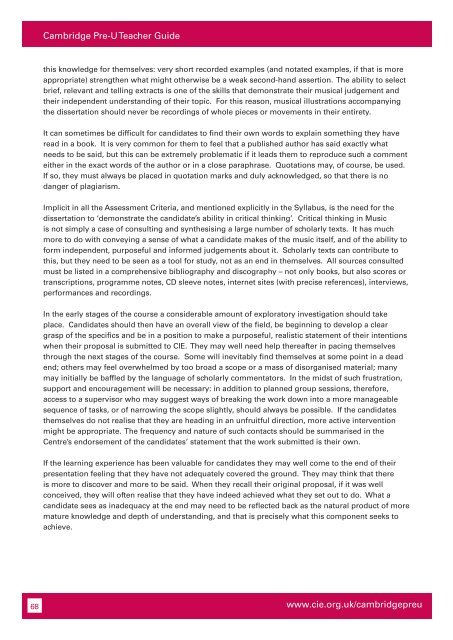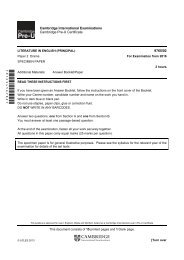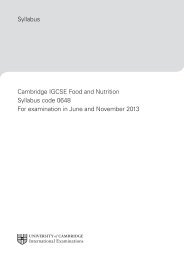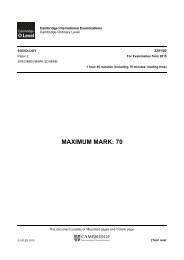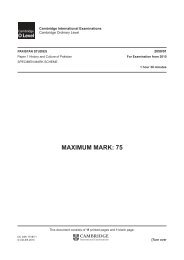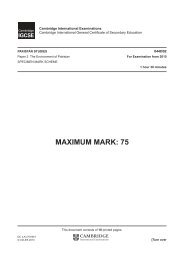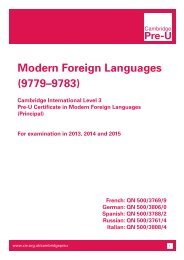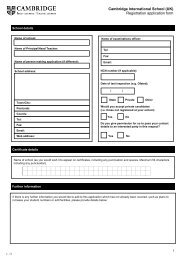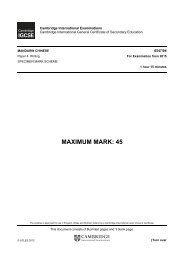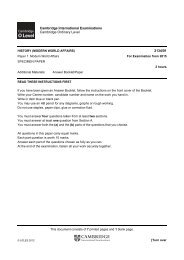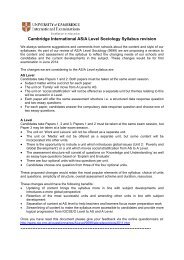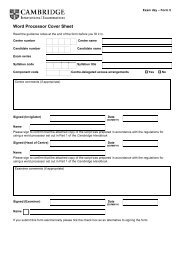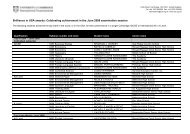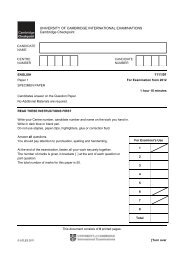Teacher's Guide Cambridge Pre-U MUSIC Available for teaching ...
Teacher's Guide Cambridge Pre-U MUSIC Available for teaching ...
Teacher's Guide Cambridge Pre-U MUSIC Available for teaching ...
Create successful ePaper yourself
Turn your PDF publications into a flip-book with our unique Google optimized e-Paper software.
68<br />
<strong>Cambridge</strong> <strong>Pre</strong>-U Teacher <strong>Guide</strong><br />
this knowledge <strong>for</strong> themselves: very short recorded examples (and notated examples, if that is more<br />
appropriate) strengthen what might otherwise be a weak second-hand assertion. The ability to select<br />
brief, relevant and telling extracts is one of the skills that demonstrate their musical judgement and<br />
their independent understanding of their topic. For this reason, musical illustrations accompanying<br />
the dissertation should never be recordings of whole pieces or movements in their entirety.<br />
It can sometimes be difficult <strong>for</strong> candidates to find their own words to explain something they have<br />
read in a book. It is very common <strong>for</strong> them to feel that a published author has said exactly what<br />
needs to be said, but this can be extremely problematic if it leads them to reproduce such a comment<br />
either in the exact words of the author or in a close paraphrase. Quotations may, of course, be used.<br />
If so, they must always be placed in quotation marks and duly acknowledged, so that there is no<br />
danger of plagiarism.<br />
Implicit in all the Assessment Criteria, and mentioned explicitly in the Syllabus, is the need <strong>for</strong> the<br />
dissertation to ‘demonstrate the candidate’s ability in critical thinking’. Critical thinking in Music<br />
is not simply a case of consulting and synthesising a large number of scholarly texts. It has much<br />
more to do with conveying a sense of what a candidate makes of the music itself, and of the ability to<br />
<strong>for</strong>m independent, purposeful and in<strong>for</strong>med judgements about it. Scholarly texts can contribute to<br />
this, but they need to be seen as a tool <strong>for</strong> study, not as an end in themselves. All sources consulted<br />
must be listed in a comprehensive bibliography and discography – not only books, but also scores or<br />
transcriptions, programme notes, CD sleeve notes, internet sites (with precise references), interviews,<br />
per<strong>for</strong>mances and recordings.<br />
In the early stages of the course a considerable amount of exploratory investigation should take<br />
place. Candidates should then have an overall view of the field, be beginning to develop a clear<br />
grasp of the specifics and be in a position to make a purposeful, realistic statement of their intentions<br />
when their proposal is submitted to CIE. They may well need help thereafter in pacing themselves<br />
through the next stages of the course. Some will inevitably find themselves at some point in a dead<br />
end; others may feel overwhelmed by too broad a scope or a mass of disorganised material; many<br />
may initially be baffled by the language of scholarly commentators. In the midst of such frustration,<br />
support and encouragement will be necessary: in addition to planned group sessions, there<strong>for</strong>e,<br />
access to a supervisor who may suggest ways of breaking the work down into a more manageable<br />
sequence of tasks, or of narrowing the scope slightly, should always be possible. If the candidates<br />
themselves do not realise that they are heading in an unfruitful direction, more active intervention<br />
might be appropriate. The frequency and nature of such contacts should be summarised in the<br />
Centre’s endorsement of the candidates’ statement that the work submitted is their own.<br />
If the learning experience has been valuable <strong>for</strong> candidates they may well come to the end of their<br />
presentation feeling that they have not adequately covered the ground. They may think that there<br />
is more to discover and more to be said. When they recall their original proposal, if it was well<br />
conceived, they will often realise that they have indeed achieved what they set out to do. What a<br />
candidate sees as inadequacy at the end may need to be reflected back as the natural product of more<br />
mature knowledge and depth of understanding, and that is precisely what this component seeks to<br />
achieve.<br />
www.cie.org.uk/cambridgepreu


